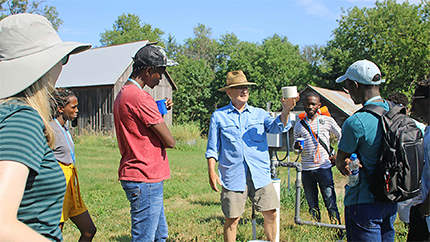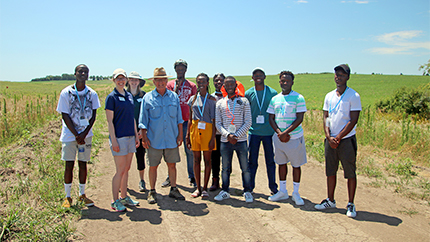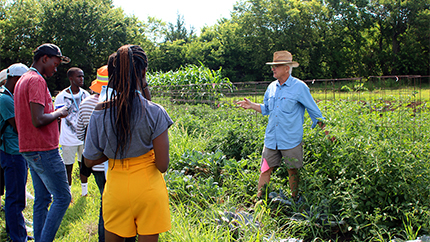In the first two weeks of July, the DWFI policy team led a two-week short course for students in the University of Nebraska–Lincoln (UNL) CASNR Undergraduate Scholar Program (CUSP). CUSP students grew up in Rwanda and traveled to UNL to study science and agriculture. After graduation, they will return to their home country to work in the agriculture sector.

While working in Rwanda on other projects, DWFI staff has often heard from many Rwandans working in business that many of the young people in the country will have to create their own jobs. The country has a young population and the available workforce is growing faster than the number of available jobs. Since Rwandan UNL students are studying agriculture and may one day start their own businesses, the DWFI short course focused on agricultural innovation and entrepreneurship.
The course introduced students to the broad ecosystem of agriculture with diverse, important actors. DWFI staff wanted to show them that growing and harvesting food is just one part of the agriculture industry. The students spoke with people from Nebraska’s Natural Resources Districts and an irrigation district, so they could learn about resource management.

During the course, students visited a large farm where the managers are quick to adopt new technologies. Since these students have spent a year studying agriculture in Nebraska, they are growing quite familiar with large-scale operations. However, they enjoyed seeing a drone in action and exploring a grain bin as we talked about effective grain storage, and how it affects grain marketing. The fact that grain storage is tied to grain marketing is a good example of the interconnectedness of all aspects of the agriculture industry.
The students also visited a small farm operation where the manager uses little technology but is strategic with his actions. Given the number of large-scale operations in Nebraska, this grower calls his field an oversized garden. However, this garden would be similar to a small farm in Rwanda. By land area, the garden is approximately 20% the size of the average Rwandan farm plot. The visit gave students a chance to explore what small-plot farming looks like in Nebraska, and how it’s different than large-scale operations. This experience is relevant for the Rwandan students because when they return to work in Rwandan agriculture, they will work with small plots much more often than larger operations.
Other tour stops and guest lectures featured agriculture-focused startups, ranging from technology companies to financial investing companies. These stops were designed to focus on entrepreneurship – what it takes to grow a business and how different business models work in practice.

Through this course, DWFI helped students identify gaps they can fill in the Rwandan agriculture sector and hopes to inspire the students to start companies to fill those gaps in the future. DWFI also helped the students develop professional skills and a network of connections they can draw on later in their careers. At the end of the course, the students shared positive feedback for the experiential learning opportunities and diverse curriculum opportunities.


